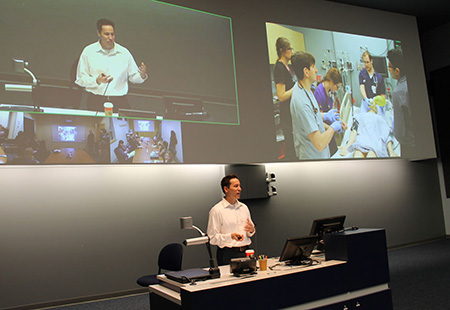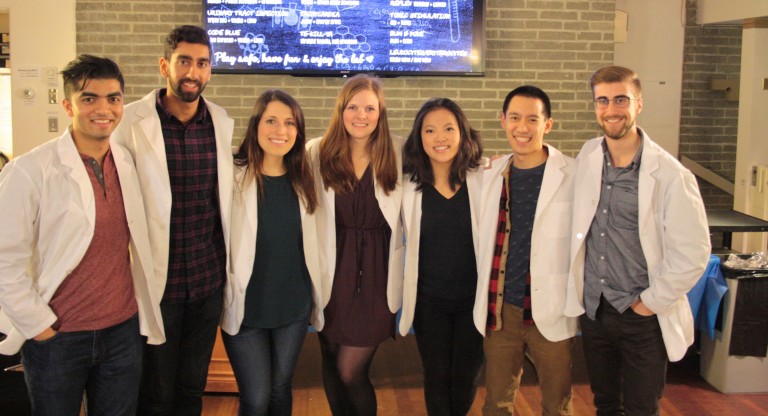We have been impressed by the outstanding academic and non-academic achievements of our applicants this year and are sorry we cannot extend interview invitations to more of you. Those of you who were not invited to interview may want additional feedback on your application. While we are unable to give one-on-one feedback, this explanation of scores might help to answer some questions. Please also see the FAQs below.
OGPA = Overall GPA in UBC percentage
AGPA = Adjusted GPA in UBC percentage
AQ Score = OGPA (if not eligible for AGPA) or AGPA, converted to a number out of 50 (50 is the maximum score). The AQ score is just your OGPA or AGPA, automatically converted to a number out of 50 by our application system. The exact conversion mechanism is confidential. It is important to emphasize that the calculation is automatically determined so if your OGPA/AGPA is correct, your AQ score is also correct. If you are a reapplicant and your AQ score is different from last year, that’s ok; the scores are standardized against the current applicant pool, which changes from year to year. This means your AQ score can change even if your OGPA/AGPA stayed the same.
NAQ Score = The score given for the non-academic portions of the application, converted to a number out of 50. In order to make sure applicants receive a fair score for this section, all file reviewers are carefully trained, there are various checks throughout the process to ensure consistency in marking, and the NAQ score is standardized to make up for any scoring variations between reviewers. Due to these safeguards we do not accept requests for re-evaluation of the non-academic section.
Please note that every year there are changes in the applicant pool which affect the scoring of the non-academic section. These include the competiveness of the pool, the addition or deletion of activities from an individual’s application, and adjustments made to the average candidate profile that reviewers use to help evaluate the non-academic sections. Therefore, NAQ scores may fluctuate from year to year.
TFR Score = AQ Score + NAQ Score. Your TFR score might be really close to the cutoff. We have double-checked these files for accuracy, so unfortunately you might just be one of the unlucky ones whose score is really close but not quite high enough to get an interview this year.
FAQs
Feedback
I was not invited for an interview; can I talk/meet with someone to discuss my application? I would like some more feedback.
Due to limited resources, we regret that we are not able to offer any feedback advising to applicants who were not granted an interview, nor can we provide any further information about the evaluation of your file. More information about scoring can be found on our Evaluation Criteria page. Reviewing the Interim Statistics on our Statistics page may also help you to identify some potential areas of improvement in your application.
I can tell why I didn’t get an interview, but how can I improve my scores?
Unfortunately, we cannot give you individual feedback about improving your scores – each person’s situation and application is unique and we do not have the resources to offer this type of advising to applicants.
In general terms, improving one’s AQ score seems fairly straightforward, in that the only way to improve a GPA is by taking more classes and achieving higher grades in those classes. It’s the related if/how/when/why/is it worth it questions that are much more complicated. You know your situation, capacities, future plans, and personal resources the best, and you are the best person to make this kind of decision. We cannot tell you what impact improving your GPA would have on your ultimate chances of acceptance.
For NAQ, we look for several things when we evaluate the non-academic portions of the application: longstanding, meaningful commitments; leadership; service ethic and altruism; ability to work with others, especially people outside of your peer group; and diverse interests and experiences. We also recognize exceptional achievements in some areas. With NAQ it is important to remember that the applicant pool isn’t made up of the same people you might normally compare yourself against, like your classmates or coworkers – it is made up of highly accomplished individuals just like you. For a further look at NAQ you might find it helpful to read the blog posts we published last year about NAQ myths: one is about NAQ scoring and one is about wording in NAQ entries. We hope this information is useful, but unfortunately we cannot offer specific ways to improve your NAQ score.
AQ
I think that there has been a mistake in the academic evaluation of my file.
The academic evaluation was based on the credits and grades entered by applicants. If you believe that there has been a specific error, please send an email via the application system detailing what you believe the mistake to be. Please note that some applicants entered wrong information – eg. did not include all courses, excluded failed courses or used letter grades instead of percentages. In these instances the Admissions Office had to correct these mistakes by verifying courses and grades on official transcripts. Therefore, there may be a discrepancy between averages calculated by an applicant and the grades as they appear on the Application Status page of his/her application.
The calculation of the AQ Score is automatically performed by the online application system, so as long as your OGPA or AGPA (if applicable) is correct, your AQ Score is also correct.
I am a re-applicant. I have not taken any further coursework so my OGPA/AGPA is the same (or I have taken further coursework and my OGPA/AGPA is higher than last year), but my scores have gone down. Why?
For the academic section of the application the actual evaluation criteria remained the same and there were no changes to the grade conversion tables used. However, academic scores, like non-academic scores, are standardized against the current applicant pool. You can check your AQ score by looking at your OGPA or AGPA (if applicable): if your OGPA/AGPA is correct, your AQ score is also correct.
I thought I should have been eligible for the AGPA to determine my academic score, but it does not seem to have been used.
The AGPA was calculated based on the courses and grades entered by applicants. The application system automatically determined (a) the lowest academic year which could be eliminated and (b) if this year could be dropped (i.e. if there were still 90 remaining credits with grades at the time of application, excluding summer 2015 courses). The Admissions Office verified that grades had been entered accurately by comparison with the official transcripts.
My overall GPA (or adjusted GPA if applicable) is slightly below the 75%/85% cut-off but I still feel my non-academic experiences are very strong and should have been reviewed.
Although we look for excellent non-academic qualities, these must also be accompanied by very good academic qualities to demonstrate an applicant’s ability to successfully handle the rigorous MD Undergraduate curriculum. It was determined that a lower AQ score (below 75% for BC and below 85% for OOP) cannot be offset by a strong NAQ score; hence these files were not reviewed.
I attended a university that did not use percentages for its grading scheme. How did UBC calculate averages from universities with different grading schemes?
Information on grade conversions, including our grade conversion tables, can be found on the Evaluation Criteria page of our website.
NAQ
I am not happy with the non-academic score I received. Can I request another review?
We appreciate that you may be dissatisfied with the scoring of the non-academic portion of your file, but would like to assure you that the non-academic portion of your application was reviewed and evaluated fairly and consistently. We will not re-evaluate the non-academic section of your file. At the beginning of each cycle, with guidelines provided by the Admissions Policy Committee, we establish a profile of an average applicant as a benchmark and points are allotted accordingly. Reviewers are trained and files are cross-checked. Although there cannot help but be a degree of subjectivity involved, we feel the standardized process keeps this to a minimum.
I am a re-applicant. I feel I have more activities and volunteer experiences than last year, but my NAQ score has not increased. Why?
Each year, the applicant pool is different, as is the average applicant profile used by non-academic evaluators. In addition, while we look for the same aptitudes and qualities each year, we periodically revise how we evaluate and score these qualities. All of these may contribute to a lower-than-expected NAQ score.
General
I was not invited for an interview and would like to appeal the decision.
We realize the importance of your application and appreciate that the results may be disappointing. Please be aware that we do our best to ensure that our evaluation practices are fair and consistent. Files are often double and sometimes triple checked to ensure accuracy. While we are unable to discuss your application over the phone, you may email Admissions through your on-line application if you have any specific concerns regarding your file evaluation. Please note that we will not re-evaluate the non-academic section of your file. We will not make appointments with the Dean, Associate Dean, Director or an Advisor/Coordinator to discuss your application.
I’m not sure if I am seeing the right thing under the scores line on my Application Status page.
This is what you should see, depending on your application status:
Ineligible: no scores
Regrets, Partial File Review: OGPA, AGPA (if applicable)
Regrets, No Interview: OGPA, AGPA (if applicable), AQ, NAQ and TFR
Invited to Interview: no scores


 This year’s play, “God of Carnage” was written by Yasmina Reza. It is about two sets of parents, one of whose child has hurt the other at a public park. The foursome meets to discuss the matter in a civilized fashion. However, as the evening goes on, the parents become increasingly childish, resulting in the evening devolving into chaos.
This year’s play, “God of Carnage” was written by Yasmina Reza. It is about two sets of parents, one of whose child has hurt the other at a public park. The foursome meets to discuss the matter in a civilized fashion. However, as the evening goes on, the parents become increasingly childish, resulting in the evening devolving into chaos.

 For more information on Hatching Health, visit
For more information on Hatching Health, visit 








